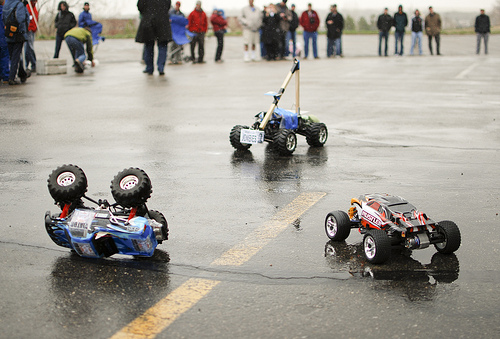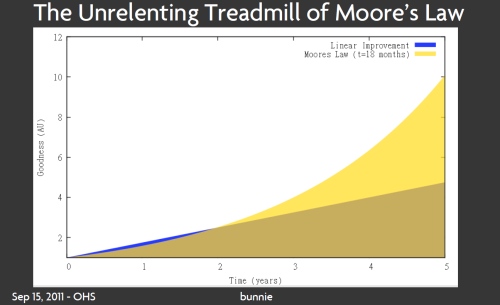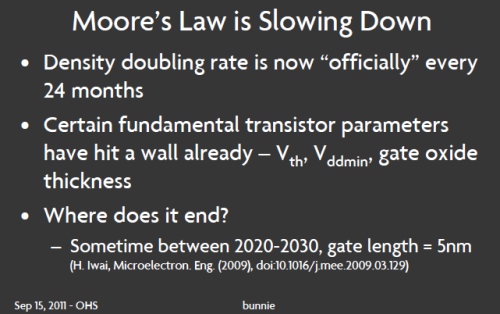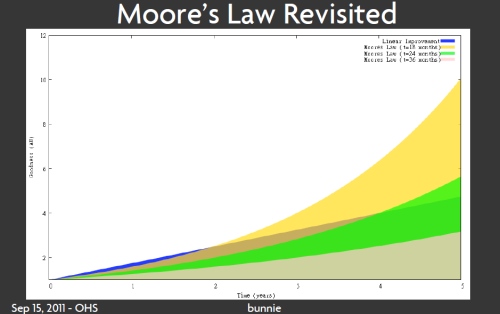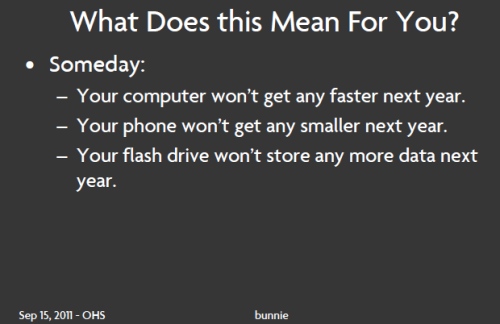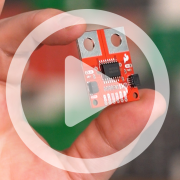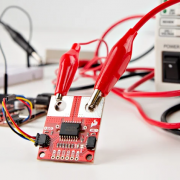In Your Lifetime
What kind of crazy things do you think will be solved within your lifetime? Cars will drive themselves, Moore will retire, and I'll know what you did last summer.
Driving 20 hours to get to the salt flats of Nevada tends to start some interesting conversations. I started asking people: "What three things do you think will occur in your lifetime?" It can be something momentous like Whirled Peas, or it could be something small like the invention of indestructible socks. I got some amazing responses!
The following are three of my own predictions:
1) Cars will drive themselves. Realize that I was driving straight across Utah and Nevada painfully willing the car to take care of itself. Thank goodness we have cruise control, but we still have to steer.
I think most folks will agree we are headed towards automation. DARPA has been on it for years. Google is doing all sorts of stuff in the background. Even SparkFun enjoys the challenge with our annual Autonomous Vehicle Competition. For $300 we can build a (small) vehicle that drives itself around obstacles.
So will we have cars driving themselves around this year? Next year? I'm not sure, but I'm confident it'll happen in my lifetime. What does this mean? All sorts of good stuff:
- Less deaths on the road
- Less congestion
- More free time for me to read books and write code
- Better gas mileage
- Higher average speeds
- Extreme public transport
- Car insurance will become wacky
My nephew and niece don't know how to dial an old rotary telephone. Imagine a generation that never sees a 'Yield' sign. It's going to be fun!
2) Moore's law will slow down to a crawl. Bunnie Huang is responsible for this one. You can checkout his slides from his presentation at the Open Hardware Summit over here.
This graph shows Moore's Law as it is today - the number of transistors doubles every 18 months. Looking at Bunnie's graph, we see the blue area represents an awesome electronic gadget that we came up with today (through linear incremental improvement). The yellow area shows that, because of Moore's Law, our grand idea will be overtaken and out dated in two years. Our great idea was out stripped by a solution (or product) that was twice as fast (and perhaps half as expensive). We see this commonly with many consumer devices (cell phones, laptops, flat TVs, etc) where they are upgraded every 18 months or so.
At least that's what I learned in school. It turns out Moore's Law has been revised. It's now every 24 months! And because of some limitations of physics that go way beyond my science fu (but I trust Bunnie any day of the week), Moore's Law will most likely continue to slide. So what happens when we re-graph things with 24 month doubling and 36 month doubling?
The yellow bar is the Moore's law we are used to. It shows our 'blue' idea being overtaken in 2 years. Look at the green bar. It shows that an improvement today will not be overtaken by Moore's Law improvements for 4 years. The beige 36 month bar extends out to 8 years!
Imagine the day when our laptops don't get significantly faster the month after we buy one? The jump drive of 2021 may have exabytes of storage on it, but the following year, it won't be any larger. We won't be able to cram any more bits into the jump drives' enclosure. It could be the jump drive that I use for 10 years instead of getting a new one every few months.
I know the idea of ending of Moore's law is a heated topic (akin to Peak Oil debates) and there is no right or wrong answer. But I believe, within my lifetime that we will see a shift from 'discardable' electronics to electronics that are serviced, maintained, and held onto for many years. It's going to be awesome.
3) Day to day encounters will be feedback based. Realize that I am going across a spectrum here. #1 is a shoe in, #2 is a stretch, #3 is bordering on Sci-Fi. In fact, it's completely Sci-Fi. If you get the chance, I highly recommend Daniel Suarez' book Daemon.
It's a great read! Daemon is science fiction that occurs not in 300 years, but in the next year or two. With a little creativity, Mr. Suarez shows how open collaboration and custom fabrication can lead to surprising innovation (including cars that drive themselves). One of the principals of the book is the idea that people have personal ratings - something like a mix of Ebay stars, like buttons, book reviews, and google stalking. Before the end of my lifetime, I believe people will be rated by how they treat their community as a whole. Volunteer at your local food bank and you're probably going to get some thumbs up. Defraud someone when you sell your used car on Craigslist and your reputation is going to be marred. Before you and I even sit down for coffee I will be able to determine whether you are someone to be trusted or someone to be questioned. I'm not sold that this is a good thing or a bad thing, but I do believe we are headed this way.
We may not have the space in the comments below but I would love to hear what you think will be achieved in your lifetime? Is it technological or is it sociological? Will we be vacationing in Cuba? Will there be many more online currencies or just one? Will we leave footprints on Mars?
